Holy Thursday and Good Friday take us to bleak places, places of great angst. A garden where grief is felt and betrayal happens, a trial where disciples run away, a death verdict, a painful walk to the place of death, a burden too heavy to carry.
Over the years I have had the privilege of walking with a number of people who carry unbearably heavy burdens, and have experienced unspeakable darkness. They sometimes ask, how can they keep going, where are they to find hope, where is God in the midst of their trials, how can they continue to believe?
There are times when words don’t help much, or at all. Superficial responses only add to the pain. Sometimes all you can do is be there, opening yourself to the pain by walking alongside, being with people in it. You hold the hope by being there, and by not giving up, not abandoning people. You accompany by being there with them in the desolate places, knowing that they are also sacred places. People who are deeply wounded will tell you, that kindness helps, it helps to heal.
In the Holy Thursday and Good Friday liturgies, we learn that this is God’s way. At the heart of what we as faith community remember of the night before Jesus died is a meal, a paschal meal which is all about brokenness. Bread is broken anticipating the breaking of Jesus’ body. Jesus surrenders his life to be broken because we are wounded, broken. God’s response to the great wounds of humanity is to be there with us in the pain. A friend who carries very heavy burdens said to me recently, it matters to her that on the cross, Jesus prays, “my God, my God, why have you abandoned me?” She asked, don’t interpret that away as Jesus just praying a line from Psalm 22. He knew abandonment. He knew that depth of darkness that hope struggles to find.
It matters that the resurrection happens in the heart of darkness. A divine response that doesn’t know the depths of human pain can’t reach the depths of human pain. And as we live these days of Holy Thursday and Good Friday, I invite you to resist jumping ahead to the resurrection. Theologian Paul Tillich notes that we lose something key when we “become insensitive to the infinite tension which is implied in the words of the Apostles’ Creed: ‘suffered… was crucified, dead, and buried…, rose again from the dead.’ We already know, when we hear the first words, what the ending will be: ‘rose again;’ and for many people it is no more than the inevitable ‘happy ending’.” We lose the understanding that God in Jesus knew pain, abandonment and death, and was buried in the earth.
Let the Holy Thursday and Good Friday liturgies teach us something about accompanying others in pain, and not running away. Let them teach us about actions that can bring healing when words can’t. I love words, but words have their limits and their place. For some of us, there is a constant temptation to come up with an answer, a reason, an explanation that somehow is going to make it better. I don’t know if anyone beneath the cross of Christ called out to him that it was going to be ok. Walking with others is more important than our explanation of why it’s OK. I don’t think it helps to give the crucified Christ, or our crucified brothers and sisters, all the reasons there are to continue to hope. Hope needs to be incarnated in presence. Jesus’ mother Mary and disciple John were there. Others brought spices, and prepared a tomb, did what they could, being there.
The most powerful messages that come through the Holy Thursday and Good Friday liturgies are in fact wordless: washing the feet of others. Bread broken, anticipating a body broken. The veneration of the cross. Lying prostrate at the start of the Good Friday liturgy. When God, author of the created order and the human condition, is crucified and buried, lying prostrate in silence speaks more articulately than words.
May these liturgies be an encouragement and invitation to each of us to have the courage to stay with others in those places of pain. God walks with us for the duration, even when the situations we are in are not fixable. Let us do likewise for each other. The Jesuit Ignacio Ellacuria, assassinated in El Salvador because of his solidarity with the poor, put it this way: nothing is more important than the exercise of mercy toward a ‘crucified people.’
Lord, our prayer today is a mostly silent prayer before your cross. May we see you in our crucified brothers and sisters. May we show you mercy there. In our hours of darkness, may others be signs of your presence to us when we can no longer carry the weight or the hope ourselves. May our hearts and minds be ever more open to and bearers of your great mercy. Through Christ, Our Crucified and Risen Lord, Amen.
Yours in Christ,
+ Donald Bolen Archbishop of Regina
